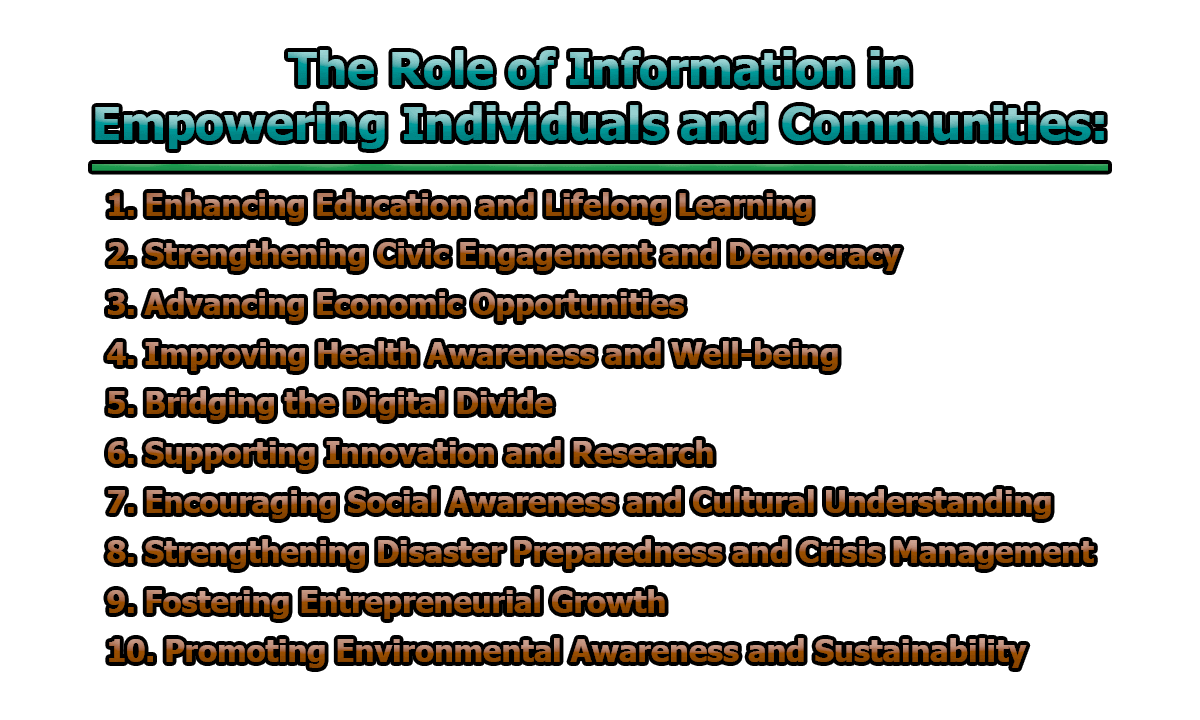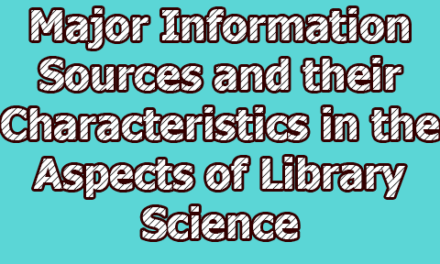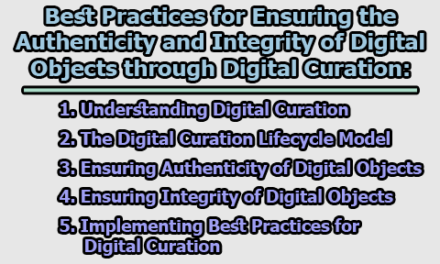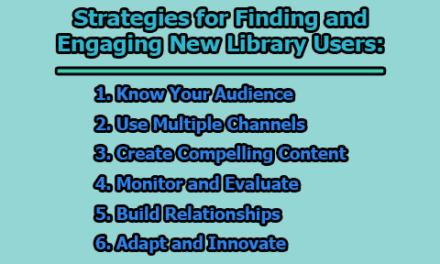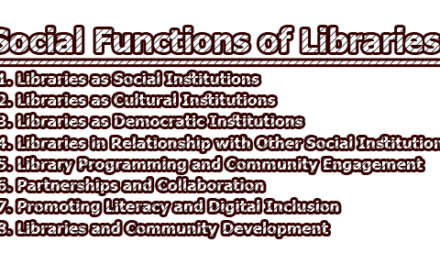The Role of Information in Empowering Individuals and Communities:
Information is a powerful tool that shapes societies, influences decisions, and drives progress. The ability to access, process, and utilize information effectively empowers individuals and communities, leading to social, economic, and political advancements. This article explores the role of information in empowering individuals and communities.
1. Enhancing Education and Lifelong Learning: Access to accurate information fosters education and lifelong learning. According to UNESCO (2021), information literacy equips individuals with the skills to critically evaluate sources and apply knowledge effectively. With digital libraries and open educational resources, individuals can pursue self-directed learning, enhancing personal and professional growth (Siemens, 2006). The internet has democratized access to knowledge, enabling students and professionals to continuously update their skills and stay competitive in an ever-changing world.
Moreover, open-access educational platforms such as Coursera, Khan Academy, and edX provide high-quality learning materials to people worldwide, breaking geographical and financial barriers (Siemens, 2006). This access to information enhances social mobility and reduces knowledge gaps, allowing more individuals to benefit from global advancements in education.
2. Strengthening Civic Engagement and Democracy: Informed citizens actively participate in governance and decision-making processes. Norris (2011) argues that access to reliable political information enables citizens to hold governments accountable and make informed voting choices. The availability of public records and transparency initiatives further strengthens democracy (Sunstein, 2017).
With the rise of digital media, individuals can engage in discussions, share opinions, and mobilize for social causes. Social media platforms, blogs, and independent journalism have empowered people to challenge misinformation and advocate for policy changes (Sunstein, 2017). Access to information has also contributed to the rise of citizen journalism, where individuals report on critical events and hold institutions accountable.
3. Advancing Economic Opportunities: Information plays a crucial role in economic empowerment by providing knowledge about job opportunities, market trends, and financial literacy. According to World Bank (2019), access to financial information helps individuals make informed investment decisions, leading to economic stability and growth. Digital platforms have further democratized access to economic resources (Dong & McIntyre, 2014).
Small businesses and entrepreneurs benefit significantly from access to market research, e-commerce platforms, and digital marketing tools. Online business resources, such as Google Analytics and LinkedIn Learning, equip business owners with insights to expand their ventures (OECD, 2019). Moreover, financial education programs have improved individual financial literacy, reducing debt and increasing savings (World Bank, 2019).
4. Improving Health Awareness and Well-being: Health information enables individuals to make informed decisions regarding their well-being. WHO (2024) emphasizes that access to accurate medical information reduces the prevalence of misinformation and promotes healthier lifestyles. The spread of digital health resources has improved disease prevention and patient care (Eysenbach, 2008).
With the rise of telemedicine and online health platforms, individuals can access medical consultations, symptom checkers, and reliable health advice from professional sources. Public health campaigns, supported by factual data, have also helped combat issues such as vaccine hesitancy and chronic disease prevention (WHO, 2024). Ensuring that health-related information is accessible and understandable remains crucial for fostering healthier communities.
5. Bridging the Digital Divide: Information technology plays a key role in reducing the digital divide by ensuring equitable access to knowledge. Castells (2009) highlights that digital inclusion enhances social mobility by providing marginalized communities with the resources needed for education and employment. Governments and NGOs are actively working towards digital literacy programs (Hargittai & Hinnant, 2008).
Providing internet access, digital devices, and training programs to underserved communities helps bridge the gap between those with and without digital skills. Public libraries, community centers, and online education initiatives have played a significant role in democratizing information access, thus empowering individuals from disadvantaged backgrounds (Hargittai & Hinnant, 2008).
6. Supporting Innovation and Research: Scientific progress depends on access to up-to-date information and research findings. Open-access journals and collaborative research platforms facilitate knowledge-sharing among scholars worldwide (Piwowar et al., 2018). This information exchange accelerates technological advancements and problem-solving in various fields (Merton, 1973).
Increased access to research findings allows for interdisciplinary collaborations and faster development of solutions to global challenges such as climate change, public health crises, and artificial intelligence. Universities and research institutions that promote open-access policies contribute significantly to knowledge dissemination and innovation (Piwowar et al., 2018).
7. Encouraging Social Awareness and Cultural Understanding: Information promotes awareness of social issues and fosters cultural appreciation. Media and educational content help individuals understand diverse perspectives, reducing biases and promoting social harmony (Perreault, 2023). Digital storytelling has also become a powerful tool for raising awareness about marginalized communities (Couldry & Mejias, 2019).
Access to historical and cultural information enables individuals to appreciate diverse traditions and values. This awareness fosters social cohesion and combats stereotypes, encouraging inclusive communities. Furthermore, media platforms play a vital role in giving voice to underrepresented groups, fostering dialogue, and promoting global understanding (Couldry & Mejias, 2019).
8. Strengthening Disaster Preparedness and Crisis Management: Timely and accurate information is crucial during crises. FEMA (2019) asserts that access to emergency information saves lives by enabling people to take appropriate action during natural disasters and pandemics. Social media and early warning systems have significantly improved disaster response efforts (Bukar et al., 2020).
With the rise of digital communication, governments and humanitarian organizations can disseminate real-time information to communities at risk. Access to emergency protocols, weather forecasts, and evacuation plans ensures better preparedness and minimizes damage. Crowdsourced data and mobile alerts have also proven effective in crisis management, enhancing public safety (Bukar et al., 2020).
9. Fostering Entrepreneurial Growth: Entrepreneurs rely on information to innovate and expand their businesses. Drucker (2015) states that market intelligence, consumer insights, and digital tools are essential for strategic decision-making in entrepreneurship. Online business resources and e-commerce platforms have opened global markets to small enterprises (OECD, 2019).
By leveraging financial data, competitor analysis, and digital marketing techniques, small businesses can compete with larger corporations. Furthermore, access to funding opportunities, mentorship programs, and government grants through online platforms enhances entrepreneurial success (OECD, 2019). The role of digital marketplaces and knowledge-sharing communities continues to grow, fostering an environment where startups can thrive.
10. Promoting Environmental Awareness and Sustainability: Access to environmental information encourages sustainable practices. Reports from the IPCC (2021) highlight the role of information in climate change mitigation by informing policymakers and the public about ecological challenges. Citizen science initiatives and digital platforms contribute to environmental advocacy and action (Goodall, 2013).
Public access to sustainability reports, eco-friendly innovations, and climate research allows individuals to make informed decisions regarding energy consumption, waste management, and conservation efforts. Educational campaigns and government policies also rely on transparent environmental data to drive change and encourage responsible behaviors (Goodall, 2013).
It is apparent that information is an essential driver of individual and community empowerment. Whether through social awareness, disaster preparedness, entrepreneurship, or environmental advocacy, access to reliable information fosters informed decision-making and societal progress. As digital transformations continue, ensuring equitable access to information remains a global priority.
Frequently Asked Questions (FAQs):
Why is information important for individual and community empowerment?
Information enables individuals to make informed decisions, access educational resources, participate in governance, and improve their economic well-being. It also helps communities address social issues, strengthen disaster preparedness, and promote sustainability.
How does access to information enhance social awareness?
Access to diverse sources of information helps individuals understand different cultures, perspectives, and social issues. This fosters inclusivity, reduces biases, and promotes cultural appreciation, leading to more cohesive and tolerant communities.
What role does information play in disaster preparedness?
Timely and accurate information is crucial during crises. It enables individuals and communities to take appropriate safety measures, respond to emergencies efficiently, and minimize damage. Digital platforms and early warning systems help disseminate critical information in real time.
How does information contribute to entrepreneurial growth?
Entrepreneurs rely on market intelligence, financial insights, and digital tools to make strategic business decisions. Access to online business resources, funding opportunities, and mentorship programs enhances business success and competitiveness.
How can information help promote environmental sustainability?
Public access to environmental research, sustainability reports, and eco-friendly innovations allows individuals and policymakers to make informed decisions about conservation efforts. Awareness campaigns and digital advocacy platforms also play a role in encouraging responsible environmental behavior.
What are the challenges to accessing reliable information?
Barriers such as misinformation, digital divides, censorship, and lack of media literacy can hinder access to accurate information. Addressing these challenges requires investment in digital literacy programs, transparent governance, and equitable internet access.
How can individuals verify the credibility of information sources?
Individuals should check the credibility of sources by cross-referencing multiple reputable sites, assessing the author’s expertise, and relying on peer-reviewed research. Fact-checking organizations and media literacy education also help combat misinformation.
How do governments and organizations ensure public access to information?
Many governments and international organizations implement open data policies, transparency initiatives, and public awareness campaigns. Libraries, digital repositories, and open-access journals also play a crucial role in making information widely available.
What is the impact of digital technology on information accessibility?
Digital technology has revolutionized information access by providing real-time updates, online education platforms, and digital libraries. However, it has also raised concerns about data privacy, misinformation, and the digital divide.
How can communities leverage information for social development?
Communities can use information to advocate for social justice, improve public health, enhance education, and support economic development. Collaboration between governments, non-profits, and tech companies can further ensure inclusive access to vital information.
References:
- Bukar, U. A., Jabar, M. A., Sidi, F., Nor, R. N. H. B., Abdullah, S., & Othman, M. (2020). Crisis informatics in the context of social media crisis communication: Theoretical models, taxonomy, and open issues. IEEE Access, 8, 185842–185869. https://doi.org/10.1109/ACCESS.2020.3030184
- Castells, M. (2009). The Rise of the Network Society. Wiley-Blackwell. https://www.doi.org/10.1002/9781444319514
- Couldry, N., & Mejias, U. A. (2019). The Costs of Connection: How Data Is Colonizing Human Life and Appropriating it for Capitalism. Stanford University Press. https://doi.org/10.1515/9781503609754
- Dong, X., & McIntyre, S. H. (2014). The Second Machine Age: Work, Progress, and Prosperity in a Time of Brilliant Technologies. Quantitative Finance, 14(11), 1895–1896. https://doi.org/10.1080/14697688.2014.946440
- Drucker, P. (2015). Innovation and Entrepreneurship: Practice and Principles. Routledge.
- Eysenbach, G. (2008). Credibility of Health Information and Digital Health Literacy. Journal of Medical Internet Research, 20(11), 123-154. Retrieved From https://www.issuelab.org/resources/833/833.pdf
- (2019). National Response Framework: Fourth Edition. U.S. Department of Homeland Security. Retrieved From https://www.fema.gov/sites/default/files/2020-04/NRF_FINALApproved_2011028.pdf
- Goodall, J. (2013). Seeds of Hope: Wisdom and Wonder from the World of Plants. Grand Central Publishing.
- Hargittai, E., & Hinnant, A. (2008). Digital Inequality: Differences in Young Adults’ Use of the Internet. Communication Research, 35(5), 602-621. https://doi.org/10.1177/0093650208321782
- (2021). Climate Change 2021: The Physical Science Basis. Cambridge University Press. Retrieved From https://www.ipcc.ch/report/ar6/wg1/
- Merton, R. K. (1973). The Sociology of Science: Theoretical and Empirical Investigations. University of Chicago Press.
- Norris, P. (2011). Democratic Deficit: Critical Citizens Revisited. Cambridge University Press.
- (2019). SME and Entrepreneurship Outlook 2019. OECD Publishing.
- Perreault, M. F. (2023). Book Reviews: Representation: Cultural Representations and Signifying Practices by Stuart Hall. Journalism & Mass Communication Quarterly, 100(4), 1009-1011. https://doi.org/10.1177/10776990231175689
- Piwowar, H., Priem, J., Larivière, V., Alperin, J. P., Matthias, L., Norlander, B., Farley, A., West, J., & Haustein, S. (2018). The state of OA: A large-scale analysis of the prevalence and impact of Open Access articles. PeerJ, 6, e4375. https://doi.org/10.7717/peerj.4375
- Siemens, G. (2006). Knowing Knowledge. Lulu Press.
- Sunstein, C. R. (2017). #Republic: Divided Democracy in the Age of Social Media. Princeton University Press.
- (2021). Global education monitoring report, 2021/2: non-state actors in education: who chooses? who loses?. UNESCO Publishing. https://doi.org/10.54676/XJFS2343
- World Bank. (2019). The Changing Nature of Work: World Development Report 2019. World Bank Publications. Retrieved From https://www.worldbank.org/en/publication/wdr2019
- (2024). World health statistics 2024: monitoring health for the SDGs, sustainable development goals. World Health Organization. Retrieved From https://www.who.int/publications/i/item/9789240094703

Library Lecturer at Nurul Amin Degree College

